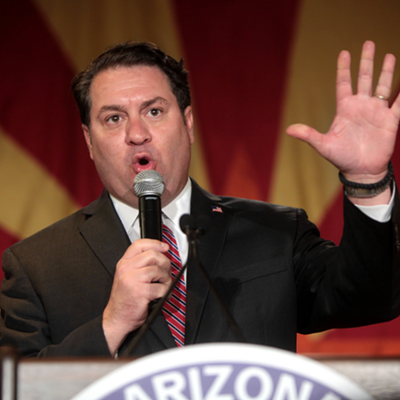INTO THE ROUGH
City Councilwoman Regina Romero announced last week that she was officially withdrawing her support for the idea of leasing or selling El Rio Golf Course to the private Grand Canyon University.
Although she had been willing to consider the idea, the outrage from her constituents forced Romero to abandon the idea.
Romero told The Skinny last week that she was willing to entertain the idea of allowing Grand Canyon University to take over the El Rio Golf Course site because the 18-hole course is a drain on the city's coffers.
"It was good to present to the community just because it turns such a money pit—a money-losing place—into a money-generator," Romero said.
As envisioned, Grand Canyon University's El Rio campus would have had as many as 6,000 students and 1,000 employees by 2020.
But El Rio Golf Course has an important symbolic value to Tucson's Chicano activists because in 1970, Chicano activists and neighborhood residents protested that while there was a golf course on the Westside for those who could afford the green fees, there weren't parks for the average resident. After a group of protestors walked across the greens, city leaders agreed to build a park and neighborhood center.
Romero is well aware of the history, but she says the protestors weren't there because they wanted to be able to play 18 holes.
"The neighbors were not fighting for open space," she says. "They were not fighting for a golf course. There were fighting for services for their community."
Romero notes that those services have been cut back in recent years as the city has continued to tighten its belt, but the golf program continues to require a subsidy from the city's general fund—which is one of the reasons, along with a possible economic boost, that Romero was willing to consider the Grand Canyon University deal.
"Here is a golf course that is sucking up half a million dollars a year, yet we're not providing the services that we should be providing our (citizens)," Romero says. "To the west of El Rio Golf Course, Joaquin Murrieta Park is crumbling."
But her arguments in favor of the idea were overshadowed by growing opposition to the idea of selling or leasing El Rio Golf Course, so Romero concluded Grand Canyon University would be a bad fit for the area.
Ward 6 Councilman Steve Kozachik says the city never should have considered El Rio Golf Course as a potential site for the campus for three reasons: Last year, the council voted to use El Rio as either a golf-training center for families or as a park; the city is in the midst of trying to find a private company to manage all of the park department's golf courses; and the Tucson Conquistadores have invested more than a million dollars to improve the golf course as part of a contract to run the First Tee golf program for kids.
"I think it was bad form, wrong site, wrong timing," Kozachik says. "Good for Grand Canyon if they want to come into the community, but it's not up to the city to start breaking contracts and running people through the whole RFP process as a fire drill and then pulling the rug out from under it just because these guys come into town. Find 'em another site."
MELVIN LOSES THE LORAX VOTE
State Sen. Al Melvin has made it clear he believes there are too many liberals, undocumented immigrants and lazy welfare recipients in the state of Arizona.
Now he wants you to know there are too many trees and the trees are stealing our water.
Melvin, who plans to run for governor next year rather than seek reelection to the Senate, is passionate about the American Land Council, which is a movement to turn federal land into state land.
Melvin tried to get some laws passed to help the state seize all that federal land, but one of his bills to make it happen was vetoed by Gov. Jan Brewer last year and the other—which appeared on the 2012 ballot as Prop 120—was rejected by two-thirds of the voters.
But Melvin isn't giving up. As he puts it, the federal land has been "infiltrated by environmentalists and lawyers."
"These environmentalists have stopped everything," he says. "No mining, no lumber operations, not cattle grazing. So instead of properly harvesting the forest and having like 60 trees per acre we have 600 and it's sucking all of the water out of the water table adding to draught conditions. Then we get a fire it kills all of the flora and the fauna. It's insane. So we want to convert the forest service over to state land and then we'll start looking at that to develop it to allow mining, lumbering and cattle grazing."
We think he forgot to mention Thneed production.
AND THEY'RE OFF
The official deadline for getting into this year's Tucson City Council races passed last week with little fanfare, so we have the lineup for our City of Tucson elections this year.
Ward 3 Democratic incumbent Karin Uhlich will have a rematch against Republican Ben Buehler-Garcia, who lost narrowly to her four years ago. You can expect Buehler-Garcia to push a message that the city needs to fix more streets and create a better focus on economic development because too many people are living in poverty.
Meanwhile, Ward 5 Democratic incumbent Richard Fimbres will face a challenge from Republican newcomer Michael Polak, 46, a former Marine who worked in the aerospace industry for 20 years.
He tells The Skinny he's running because "I see a lot of problems here in Tucson that need to be fixed."
Polak, who moved to Tucson five years ago to work on Boeing's border-surveillance efforts, says his top issues include creating more jobs, fixing streets, supporting law enforcement and improving parks.
Barring some kind of write-in campaign, Ward 6 Councilman Steve Kozachik chased off any challenges when he jumped from the Republican Party to the Democratic Party earlier this year.
Republican activist Frank Antenori, who frequently tangled with Kozachik after helping him get elected four years ago, said that he couldn't find someone to run against him.
"Nobody wants to run," Antenori said. "Everybody I talk to, they're like, 'Screw it, I'm moving my business' or 'I'm done with these guys, I give up.' It's a sad, defeatist attitude, but they think the city is so far gone, it ain't even worth putting any effort into it."
Given that attitude, Antenori said that the GOP candidates might have trouble drumming up much support this year.
"The energy is not there," Antenori said. "People are just resigned to the fact that the city is a lost cause, that it's just this stupid-idea, anti-business, spending-spree municipality that going to eventually go bankrupt and they're all waiting for the day when it goes under."
Kozachik tells The Skinny via email he plans to "keep the campaign in high gear until the meter runs out on people being able to file as a write-in. It happened in the last mayoral cycle, and so I'm not going to be caught flat footed if it happens again this time. ... If somebody wants to jump into the race, they'll have to be ready to hit the ground running, because I am."
Given that there are just two races, no primaries and no fringe third-party candidates, we'd agree with Frank that it's shaping up to be one of the quietest election years in recent memory.
Still, John Kromko and Co. are still out there gathering signatures for an initiative that would ban photo-radar enforcement of traffic laws, so we may have some fireworks there. And there's a mandatory update of the city's general plan that various activists are trying to build a conspiracy theory around, but that's likely to be a snoozer of an issue for most voters.








